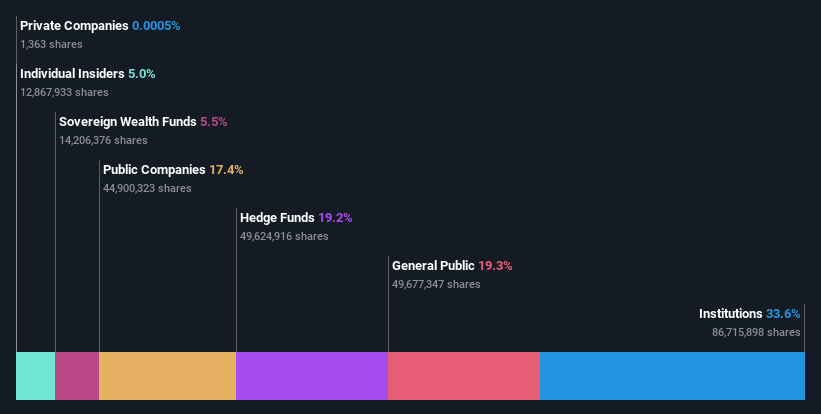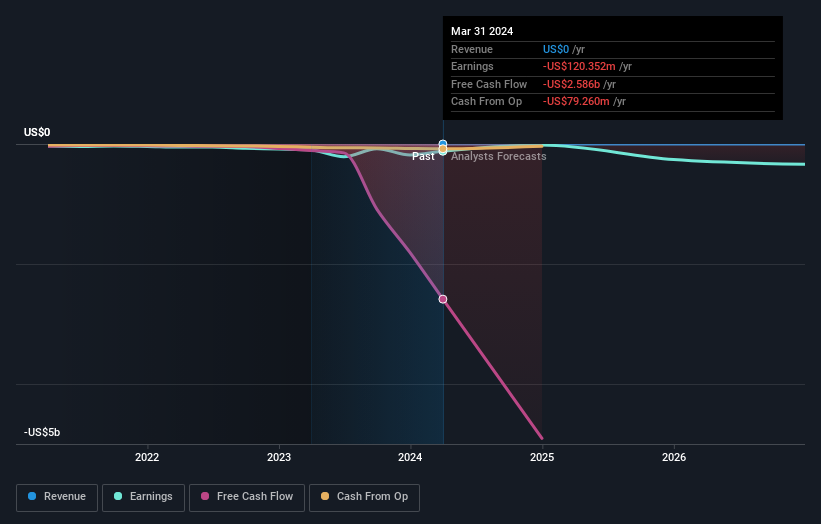Institutional owners may take dramatic actions as NextDecade Corporation's (NASDAQ:NEXT) recent 4.7% drop adds to one-year losses
Key Insights
Significantly high institutional ownership implies NextDecade's stock price is sensitive to their trading actions
The top 6 shareholders own 52% of the company
Past performance of a company along with ownership data serve to give a strong idea about prospects for a business
Every investor in NextDecade Corporation (NASDAQ:NEXT) should be aware of the most powerful shareholder groups. And the group that holds the biggest piece of the pie are institutions with 34% ownership. In other words, the group stands to gain the most (or lose the most) from their investment into the company.
And institutional investors endured the highest losses after the company's share price fell by 4.7% last week. The recent loss, which adds to a one-year loss of 6.9% for stockholders, may not sit well with this group of investors. Also referred to as "smart money", institutions have a lot of sway over how a stock's price moves. As a result, if the downtrend continues, institutions may face pressures to sell NextDecade, which might have negative implications on individual investors.
Let's delve deeper into each type of owner of NextDecade, beginning with the chart below.
View our latest analysis for NextDecade
What Does The Institutional Ownership Tell Us About NextDecade?
Institutions typically measure themselves against a benchmark when reporting to their own investors, so they often become more enthusiastic about a stock once it's included in a major index. We would expect most companies to have some institutions on the register, especially if they are growing.
As you can see, institutional investors have a fair amount of stake in NextDecade. This suggests some credibility amongst professional investors. But we can't rely on that fact alone since institutions make bad investments sometimes, just like everyone does. When multiple institutions own a stock, there's always a risk that they are in a 'crowded trade'. When such a trade goes wrong, multiple parties may compete to sell stock fast. This risk is higher in a company without a history of growth. You can see NextDecade's historic earnings and revenue below, but keep in mind there's always more to the story.
It looks like hedge funds own 19% of NextDecade shares. That's interesting, because hedge funds can be quite active and activist. Many look for medium term catalysts that will drive the share price higher. The company's largest shareholder is TotalEnergies SE, with ownership of 17%. With 14% and 6.4% of the shares outstanding respectively, JGD Management Corp. and BlackRock, Inc. are the second and third largest shareholders. Additionally, the company's CEO Matthew Schatzman directly holds 0.6% of the total shares outstanding.
We also observed that the top 6 shareholders account for more than half of the share register, with a few smaller shareholders to balance the interests of the larger ones to a certain extent.
While it makes sense to study institutional ownership data for a company, it also makes sense to study analyst sentiments to know which way the wind is blowing. There is some analyst coverage of the stock, but it could still become more well known, with time.
Insider Ownership Of NextDecade
While the precise definition of an insider can be subjective, almost everyone considers board members to be insiders. Management ultimately answers to the board. However, it is not uncommon for managers to be executive board members, especially if they are a founder or the CEO.
Most consider insider ownership a positive because it can indicate the board is well aligned with other shareholders. However, on some occasions too much power is concentrated within this group.
Our most recent data indicates that insiders own some shares in NextDecade Corporation. This is a big company, so it is good to see this level of alignment. Insiders own US$100m worth of shares (at current prices). Most would say this shows alignment of interests between shareholders and the board. Still, it might be worth checking if those insiders have been selling.
General Public Ownership
The general public-- including retail investors -- own 19% stake in the company, and hence can't easily be ignored. This size of ownership, while considerable, may not be enough to change company policy if the decision is not in sync with other large shareholders.
Public Company Ownership
Public companies currently own 17% of NextDecade stock. This may be a strategic interest and the two companies may have related business interests. It could be that they have de-merged. This holding is probably worth investigating further.
Next Steps:
It's always worth thinking about the different groups who own shares in a company. But to understand NextDecade better, we need to consider many other factors. Take risks for example - NextDecade has 5 warning signs (and 4 which shouldn't be ignored) we think you should know about.
But ultimately it is the future, not the past, that will determine how well the owners of this business will do. Therefore we think it advisable to take a look at this free report showing whether analysts are predicting a brighter future.
NB: Figures in this article are calculated using data from the last twelve months, which refer to the 12-month period ending on the last date of the month the financial statement is dated. This may not be consistent with full year annual report figures.
Have feedback on this article? Concerned about the content? Get in touch with us directly. Alternatively, email editorial-team (at) simplywallst.com.
This article by Simply Wall St is general in nature. We provide commentary based on historical data and analyst forecasts only using an unbiased methodology and our articles are not intended to be financial advice. It does not constitute a recommendation to buy or sell any stock, and does not take account of your objectives, or your financial situation. We aim to bring you long-term focused analysis driven by fundamental data. Note that our analysis may not factor in the latest price-sensitive company announcements or qualitative material. Simply Wall St has no position in any stocks mentioned.
Have feedback on this article? Concerned about the content? Get in touch with us directly. Alternatively, email editorial-team@simplywallst.com

 Yahoo Finance
Yahoo Finance 

